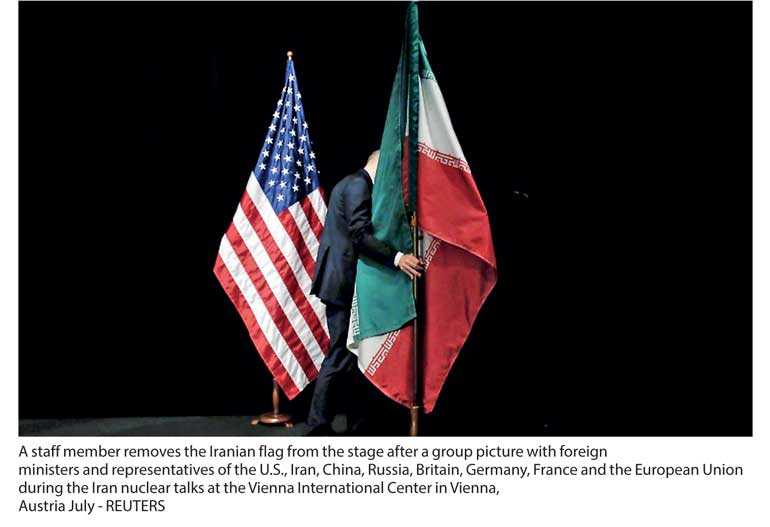Wednesday Feb 25, 2026
Wednesday Feb 25, 2026
Friday, 5 October 2018 00:00 - - {{hitsCtrl.values.hits}}

THE HAGUE (Reuters): The world court ordered the United States on Wednesday to ensure that sanctions against Iran, due to be tightened next month, do not affect humanitarian aid or civil aviation safety.
Judges at the International Court of Justice (ICJ) handed a small victory to Tehran, which had argued that sanctions imposed since May by the administration of US President Donald Trump violate terms of a 1955 Treaty of Amity between the two countries.
But US Secretary of State Mike Pompeo rejected the decision. He said the United Nations court, often called the “world court”, had no jurisdiction over the sanctions, which Pompeo said were essential to US security interests, and that Washington would “terminate” the little-known treaty with Iran.
“This is a decision frankly that is 39 years overdue,” Pompeo told a news conference. “Iran is abusing the ICJ for political and propaganda purposes and their case, as you can see from the decision, lacked merit.”
Pompeo said the United States had already taken steps to ensure that the sanctions, which it intends to tighten next month, do not impact humanitarian aid – regardless of the court’s ruling.
The court order issued on Wednesday was temporary, pending a resolution of Iran’s full lawsuit against Washington at the ICJ, something that could take years.
Iran’s Foreign Ministry said in a statement “the decision proved once again that the Islamic Republic is right and the US sanctions against people and citizens of our country are illegal and cruel.
“The United States must comply with its international commitments and lift obstacles to Iranian trade,” it added.
The ICJ is the United Nations’ highest court for resolving disputes between nations. Its rulings are binding, but it has no power to enforce them, and both the United States and Iran have ignored them in the past.
The court said assurances offered by Washington to ensure sanctions do not affect humanitarian conditions were “not adequate”.
“The court considers that the United States must remove by means of its choosing any impediment arising from the measures announced on 8 May,” said Presiding Judge Abdulqawi Yusuf, reading a summary of a ruling by the 15-member panel of justices.
The sanctions may not hurt “exportation to the territory of Iran of goods required for humanitarian needs such as medicines, medical devices and foodstuffs and agricultural commodities as well as goods and services required for the safety of civil aviation,” he said.
While US sanctions “in principle” exempt food and medical supplies, the court said “it has become difficult if not impossible for Iran, Iranian nationals and companies to engage in international financial transactions” to purchase such goods.
WASHINGTON (Reuters): The Trump administration on Wednesday pulled out of two international agreements after Iran and the Palestinians complained to the International Court of Justice about US policies, the latest withdrawal by Washington from multilateral accords.
US National Security Adviser John Bolton slammed the highest United Nations tribunal as “politicised and ineffective” as he announced that the United States would review all international agreements that could expose it to binding decisions by the ICJ.
Earlier on Wednesday the ICJ handed a victory to Tehran, ordering the United States to ensure that sanctions against Iran, due to be tightened next month, do not affect humanitarian aid or civil aviation safety.
The ICJ, based in The Hague, Netherlands, is the United Nations’ venue for resolving disputes between nations.
There have been mounting concerns among US allies about the Trump administration’s commitment to multilateralism.
In the nearly two years since being elected, President Donald Trump has withdrawn the United States from a nuclear agreement between six powers and Iran, pulled out of a global climate accord, left the UN cultural agency, and threatened NATO military allies that the United States would “go its own way” if members did not spend more on defence.
Bolton, citing what he called “Iran’s abuse of the ICJ,” said the United States would also withdraw from the “optional protocol” under the 1961 Vienna Convention of Diplomatic Relations.
“We will commence a review of all international agreements that may still expose the United States to purported binding jurisdiction, dispute resolution in the International Court of Justice,” Bolton said on Wednesday. “The United States will not sit idly by as baseless politicised claims are brought against us.”
The decision to withdraw from the optional protocol follows a complaint brought by the Palestinians in September, which challenged Washington’s decision to move its Embassy from Tel Aviv to Jerusalem.
The Vienna Convention is an international treaty setting out diplomatic relations between States. It is often cited as a means to provide diplomatic immunity.